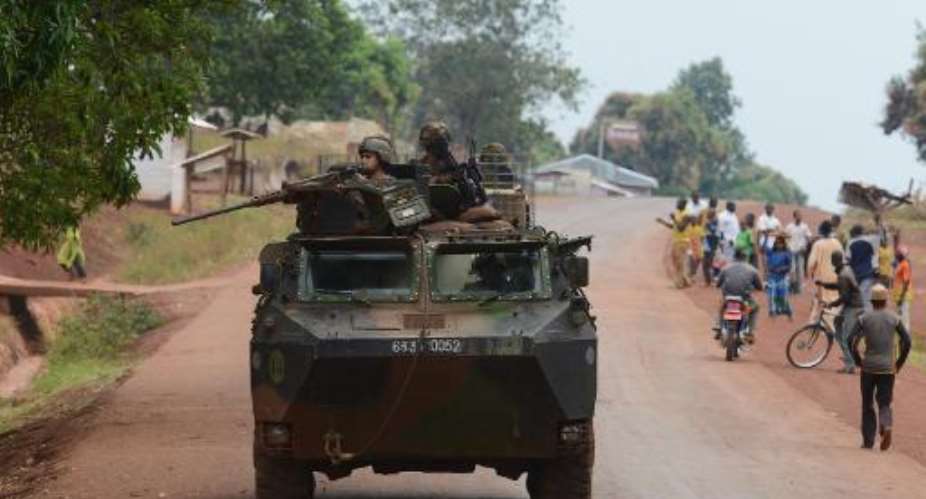Bangui (Central African Republic) (AFP) - Around 200 fighters in the strife-torn Central African Republic who surrendered to African Union troops at the weekend in a key northern town have fled, a military source said Sunday.
"Unfortunately they fled in the night. They've gone to Kaga Bandoro," an officer in the AU force known as MISCA told AFP.
Kaga Bandoro is some 160 kilometres (100 miles) north of Sibut, the town that former members of the mainly Muslim Seleka rebellion seized last week -- causing terrified residents to flee -- before MISCA troops recaptured it on Saturday.
It is thought the ex-rebels fled because of fear of revenge attacks by members of Christian militia known as "anti-balaka" (anti-machete), in a cycle of violence that has raged nearly unabated in the volatile country for 10 months.
The former French colony descended into chaos last March when the Seleka overthrew the government and installed one of their leaders, Michel Djotodia, as the country's first Muslim president.
Around 80 percent of the population is Christian, but it has a significant Muslim minority who live mainly in the north.
Djotodia failed to control his fighters, who began targeting Christians, prompting revenge attacks on Muslims amid reports of murder, mutilation, rape and looting by both sides.
By the time Djotodia was effectively ousted by regional leaders on January 10 for his failure to end the spiralling bloodshed, about a million people were displaced in a population of 4.6 million.
Violence has persisted despite the election of transitional President Catherine Samba-Panza last month with a mandate to pacify a country whose central government has always struggled to assert its authority beyond the capital.
Fighting has in fact escalated recently, even in Bangui, with Red Cross officials saying Friday that they had collected 30 bodies after clashes in the capital that also left 60 people wounded.
In Sibut, the former rebels had initially agreed to be held by the African peacekeepers -- a Gabonese contingent that entered the town on Saturday.
'We want secure camps'
But Colonel Abdelkader Djelani, a Seleka officer who was among those who fled Sibut, said security was a key issue for them, asserting that anti-balaka fighters had attacked Seleka members confined to camps in Bangui.
"We want solutions and really secure camps," Djelani said.
A Sibut resident told AFP by telephone that most residents who fled had returned home by late afternoon Sunday.
The African soldiers occupied most of Sibut's strategic locations, he said, while a MISCA officer said they had encountered no resistance as they went about securing the town.
Meanwhile the anti-balaka have begun handing in their weapons to MISCA, the officer said.
The taking of the northern town was the latest challenge faced by peacekeepers struggling to maintain order in a country the size of France with a long history of coups, attempted coups and army mutinies.
MISCA is supported by a French contingent of around 1,600 troops, and the European Union has committed a further 500 troops.
However, Samba-Panza has said more troops are needed to deal with the lawless interior, where few or no foreign troops are present.
The capture of Sibut came on the same day that MISCA received pledges of $132 million (98 million euros) from other African states.
A total of almost $315 million has now been raised or pledged for the country, though AU officials said MISCA needs 304 million euros just to keep going for one year.
Samba-Panza on Friday accused the former rebels of aiming to "destabilise her mandate" at a time when the government was calling for tolerance and national reconciliation.
The violence has created a humanitarian crisis, and the UN World Food Programme said in Geneva it urgently needed $95 million to provide food assistance.





 Saglemi Housing Project will not be left to rot – Kojo Oppong Nkrumah
Saglemi Housing Project will not be left to rot – Kojo Oppong Nkrumah
 Transport fares hike: GPRTU issue two-day ultimatum
Transport fares hike: GPRTU issue two-day ultimatum
 ARC endorses Alan as presidential candidate – Buaben Asamoa
ARC endorses Alan as presidential candidate – Buaben Asamoa
 Akufo-Addo appoints Kwasi Agyei as new Controller and Accountant-General
Akufo-Addo appoints Kwasi Agyei as new Controller and Accountant-General
 PNC dismiss reports of mass resignations
PNC dismiss reports of mass resignations
 PAC advocates for revenue collectors to be engaged on commission basis, not full...
PAC advocates for revenue collectors to be engaged on commission basis, not full...
 Genser Energy commissions 110km of natural gas pipeline at Anwomaso
Genser Energy commissions 110km of natural gas pipeline at Anwomaso
 Naa Torshie calls for tolerance, peace ahead of 2024 election
Naa Torshie calls for tolerance, peace ahead of 2024 election
 Asantehene commends Matthew Opoku Prempeh for conceiving GENSER Kumasi Pipeline ...
Asantehene commends Matthew Opoku Prempeh for conceiving GENSER Kumasi Pipeline ...
 Let’s do away with ‘slash and burn politics’ in Ghana — Dr Adutwum
Let’s do away with ‘slash and burn politics’ in Ghana — Dr Adutwum
